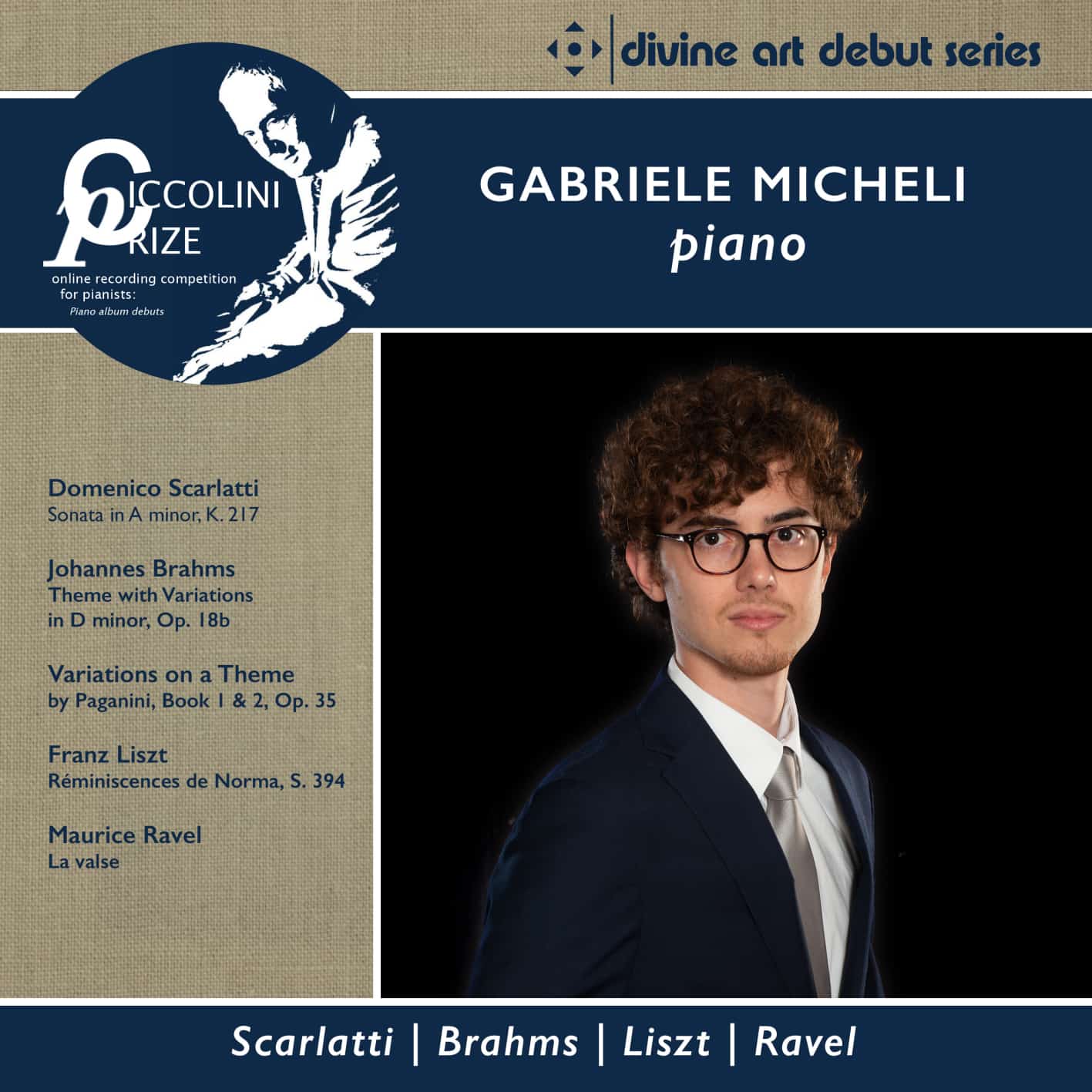InfoDad
Another very fine Divine Art recording offers more-varied and somewhat less-familiar fare, but by and large still in the Romantic tradition. Gabriele Micheli’s primary focus here is Brahms, but before that, the CD offers the only non-Romantic piece on the disc: a Domenico Scarlatti sonata that does not quite fit on the modern piano (or any piano), and that is played with greater warmth and a bit more of the sustaining pedal then is really appropriate for music of the early 18th century. The inclusion of this work as a curtain raiser is something of a mystery, since Micheli is clearly more at home in interpreting the rest of the pieces on the disc. The Scarlatti is followed by another slightly odd choice that, however, fits Micheli’s style better: Brahms’ piano arrangement of the second movement of his String Sextet No. 1, transcribed for piano by the composer as a birthday gift for Clara Schumann, who had asked him to do so. The movement is a noble one, mixing elements of proclamation with the sound of a solemn march, all within variation form. It is a touch on the heavy side in Micheli’s performance, which is a bit slow and which seeks the emphatic more than the emotionally expressive. The playing is first-rate, however, which makes the overall reading a convincing one. What follows on the CD comes across even better. Brahms’ Variations on a Theme by Paganini, Books I and II, based on the famed Caprice No. 24,manage to straddle the worlds of theme-and-variations on the one hand, and étude on the other – Brahms actually called this work Studies for Pianoforte. Each of the two books starts with the caprice itself and then presents 14 variations, the last of which is the most virtuosic in both sequences. Micheli really goes to town with this material, attacking the keyboard with abandon that is nevertheless carefully controlled – and handling the considerable technical challenges of the variations with tremendous skill and a certain panache, especially in the second book. Pianistically impressive, the performance is not particularly deep, but unlike much other Brahms piano music, Variations on a Theme by Paganiniis primarily a display piece, not a profound one. Micheli clearly enjoys a certain level of showing off, as is apparent in his handling of Liszt’s Réminiscences de Norma, which takes the dramatic core of Bellini’s opera and turns it into a piece of great power and concentrated drama. Not incidentally, Liszt also makes the work a grand showpiece for the pianist; and again, Micheli relishes the challenge and rises to it in a performance of considerable sweep and intensity. After the Liszt, this CD concludes with Ravel’s La Valse, originally an orchestral work but transcribed by the composer for two pianos and subsequently for a single one. There is a subtle, bittersweet character to the music, whose implied irony – or lack thereof – continues to be a source of debate. Micheli plumbs the depths of the piece, quite literally in the growling way he handles the opening, and while he allows some of the “gradual illumination” of dancers that Ravel said the work includes, the general feeling here is a dark one – the eerie material in the work’s second half sounds especially disconcerting in this performance. The impressionistic nature of the music is less apparent in Ravel’s piano versions than in the orchestral one – the odd playfulness of flute, glockenspiel and triangle at one point, for example, falls a bit flat on keyboard. But the lighter elements of La Valse are not Micheli’s focus in any case: he highlights the restless and grandiose elements rather than the tender and sweet ones. The result is a rather dour La Valse – a justifiable interpretation, certainly, and a very well-played one, but perhaps not quite as sensitive to the many internal contrasts that Ravel built into the work as other readings have been. As a whole, this is a (+++) disc, characterized throughout by excellence of playing but also by somewhat quirky, if not quite ill-considered, handling of several of the pieces.
@divineartrecordingsgroup
A First Inversion Company
Registered Office:
176-178 Pontefract Road, Cudworth, Barnsley S72 8BE
+44 1226 596703
Fort Worth, TX 76110
+1.682.233.4978
We noticed you're visiting from Latvia. We've updated our prices to Euro for your shopping convenience. Use Pound sterling instead. Dismiss












